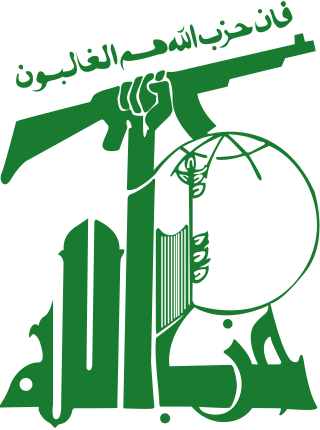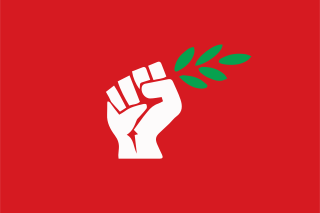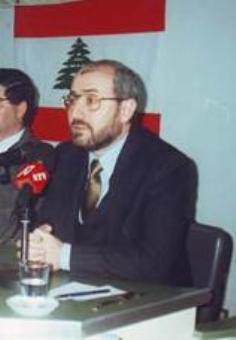Related Research Articles

Hezbollah is a Lebanese Shia Islamist political party and militant group, led since 1992 by its Secretary-General Hassan Nasrallah. Hezbollah's paramilitary wing is the Jihad Council, and its political wing is the Loyalty to the Resistance Bloc party in the Lebanese Parliament.

Michel Naim Aoun is a Lebanese politician and former military general who served as the President of Lebanon from 31 October 2016 until 30 October 2022.

The Free Patriotic Movement is a Lebanese political party. Founded by Michel Aoun in 1994, the party is currently led by Aoun's son-in-law Gebran Bassil since 2015.

Fouad Siniora is a Lebanese politician, a former Prime Minister of Lebanon, a position he held from 19 July 2005 to 25 May 2008. He stepped down on 9 November 2009 in favor of Saad Hariri, the late Rafik Hariri's son. He is the leader of the parliamentary group of the Future Movement.
Keysar Trad is the founder of the Islamic Friendship Association of Australia and is the former president of the Australian Federation of Islamic Councils.

Gebran Ghassan Tueni was a Lebanese politician and the former editor and publisher of daily paper An Nahar, established by his grandfather, also named Gebran Tueni, in 1933. He was assassinated in 2005 as part of a series of assassinations of Syria's critics in Lebanon.

Marwan Hamadeh is a Lebanese journalist and politician, who served in various capacities in different cabinets, including minister of education, minister of telecommunications, minister of economy and trade, minister of tourism, minister of health and minister for the displaced. He served as a member of the Lebanese parliament until his resignation, on 5 August 2020, after the explosions in Beirut claiming that the government was "ineffective" to handle the incident.
Muhammad Fneish is a Shia Lebanese politician and member of Hezbollah. He represented Hezbollah in the Third Cabinet of Saad Hariri, serving as the Minister of Sports and Youth.

The 2006 Lebanon War, also called the 2006 Israel–Hezbollah War and known in Lebanon as the July War and in Israel as the Second Lebanon War, was a 34-day military conflict in Lebanon, northern Israel and the Golan Heights. The principal parties were Hezbollah paramilitary forces and the Israel Defense Forces (IDF). The conflict started on 12 July 2006, and continued until a United Nations-brokered ceasefire went into effect in the morning on 14 August 2006, though it formally ended on 8 September 2006 when Israel lifted its naval blockade of Lebanon. Due to unprecedented Iranian military support to Hezbollah before and during the war, some consider it the first round of the Iran–Israel proxy conflict, rather than a continuation of the Arab–Israeli conflict.
United Nations Security Council Resolution 1701 is a resolution that was intended to resolve the 2006 Lebanon War.
Along with the Amal Movement, Hezbollah is one of the two main parties representing the Shia community, Lebanon's largest religious bloc. Amal has made a commitment to carrying out its activities through political means, but remains a partial fighting force aiding Hezbollah when the need arises.
Hezbollah has a military branch and is the sponsor of a number of lesser-known groups, some of which may be little more than fronts for Hezbollah itself. These groups include the Organization of the Oppressed, the Revolutionary Justice Organization, the Organization of Right Against Wrong, and Followers of the Prophet Muhammad.

The March 14 Alliance, named after the date of the Cedar Revolution, was a coalition of political parties and independents in Lebanon formed in 2005 that were united by their anti-Syrian stance and by their opposition to the March 8 Alliance. It was led by Saad Hariri, Walid Jumblatt and Samir Geagea, as well as other prominent figures.

Pierre Amine Gemayel was a Lebanese politician in the Kataeb Party, also known as the Phalange Party in English.

The 2006–2008 Lebanese protests were a series of political protests and sit-ins in Lebanon that began on 1 December 2006, led by groups that opposed the US and Saudi-backed government of Prime Minister Fouad Siniora and ended on 21 May 2008 with the signing of the Doha Agreement. The opposition was made up of Hezbollah, Amal, and the Free Patriotic Movement (FPM); a number of smaller parties were also involved, including the Marada party, the Lebanese Communist Party and the Syrian Social Nationalist Party. A majority of the members of the government were part of the anti-Syrian March 14 Alliance, a coalition of political parties and independents in Lebanon. The two groups were also divided along religious lines, with most Sunnis and Druze supporting the government, and most Shi'a supporting the opposition. The Christian community was split between the two factions, with Michel Aoun, the leader of the FPM, claiming to have more than 70% support among the Christians, based on the results of the 2005 parliamentary election.

The 2008 Lebanon conflict was a brief intrastate military conflict in May 2008 in Lebanon between opposition militias and pro-government Sunnis, after the 18-month-long political crisis spiraled out of control, when the government's decision to dismantle Hezbollah's telecommunication system, which led to Hezbollah seizing control of west Beirut, and ended with the adoption of the Doha Accord in 2008.

Ali Khalil Qanso was a Lebanese politician who served as a minister for parliamentary affairs in the second cabinet of Saad Hariri. He was the president of the Syrian Social Nationalist Party and he served as minister of state in Najib Mikati government and previously minister of labor in the cabinet of Rafik Hariri.

Ghazi Aridi is a Lebanese politician who has held various cabinet portfolios. He was the minister of public works and transportation from 13 June 2011 to December 2013.
Issam Abu Jamra is a retired Lebanese major general and a politician, who served as deputy prime minister in the cabinets of Michel Aoun and Fouad Siniora. Until 2010 he was part of the Free Patriotic Movement (FPM).
References
- 1 2 3 "An unusual meeting with the minister about an unusual memorandum". Indymedia. 1 December 2005. Archived from the original on 18 January 2011. Retrieved 5 October 2012.
- ↑ "Trad Hamadeh for Unions-Resistance Alliance". Naharnet. 1 May 2008. Archived from the original on 29 January 2013. Retrieved 5 October 2012.
- ↑ Habib, Osama (27 February 2008). "Hamadeh returns to post at Labor Ministry". The Daily Star. Retrieved 5 October 2012.
- ↑ "Lebanon: A Cabinet is Formed". Wikileaks. 11 July 2008. Archived from the original on 21 February 2013. Retrieved 5 October 2012.